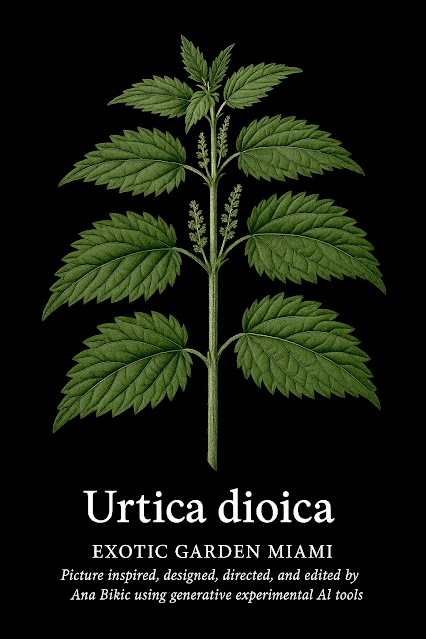 |
| Urtica Dioca Nettle Plant Herb Care - Medicinal, Botanical Garden |
Check the Complete List of Plants, Trees, Ornamental and Medicinal Plants
🌿 Urtica Dioica Nettle - Stinging Nettle
Medicinal Herb & Edible Wild Plant for Tropical and Exotic Gardens
✅ Botanical Profile
-
Place of Origin: Europe, Asia, North Africa
-
Scientific Name: Urtica dioica
-
Growing Zone: USDA Zones 3–10 (grows well in South Florida with care)
-
Soil: Rich, moist, well-drained loam with compost
-
Light: Full sun to partial shade
-
Watering: Moderate; prefers evenly moist soil
-
pH: 5.5 to 7.8
-
Toxicity: Stinging hairs may irritate skin; safe when cooked or dried. Non-toxic to pets when prepared.
-
Pests: Generally pest-resistant due to stinging hairs
-
Insecticidal Use: Used in fermented teas as natural pest repellent
-
Pot Care: Thrives in large, deep pots with moist soil; cut back regularly
🌸 Cultural & Historical Significance
Used by ancient Greeks and Romans for treating wounds, arthritis, and urinary issues. In medieval Europe, nettle was spun into fiber before flax and cotton. A sacred plant in many cultures, used in folk rituals for protection and vitality.
💊 Medicinal Properties, Lab Studies & Health Uses
-
Anti-inflammatory & Analgesic: Reduces joint pain, arthritis, and muscle inflammation
-
Diuretic: Supports urinary tract and kidney health
-
Antioxidants: Contains flavonoids, polyphenols, and chlorophyll
-
Lab Studies: Demonstrated effects on reducing symptoms of benign prostatic hyperplasia (BPH) and hay fever
-
Topical Use: Relieves eczema, dandruff, skin irritation, and promotes hair growth
-
Internal Use: Nettle tea or capsules support immunity, reduce allergies, and detox the liver
🌿 Vitamins & Nutrients
Rich in Vitamins A, C, K, B-complex, Iron, Calcium, Magnesium, Potassium, and Chlorophyll – making it a nutrient powerhouse for skin, blood, and immune system support.
🍽️ Other Uses
-
Edible: Leaves are consumed in soups, teas, and sautés
-
Fiber: Historically used to produce fabric and rope
-
Fertilizer: Leaves used in compost or liquid feed for gardens
-
Ecological: Supports butterfly larvae and pollinators like bees
🌿 Legal & Environmental Relevance
A historically undervalued crop with immense herbal, textile, and ecological potential. Legal everywhere, but often removed as a weed, despite its usefulness. Deserves reintroduction into urban gardens and wild medicinal spaces.
Urtica Dioica, Stinging Nettle, Wild Herb, Medicinal Plant, Edible Greens, Herbal Tea, Natural Fiber, Anti-Inflammatory, South Florida Garden, Immune Support, Vitamin Rich, Detox Plant
-
Medicinal Wild Nettle Plant For South Florida Gardens
-
Ancient Healing Herb Rich In Minerals And Vitamins
-
Edible And Insecticidal Nettle Used In Herbal Medicine
-
Botanical Detox Tea Plant For Health And Skin
-
Organic Nutrient-Dense Plant For Exotic Urban Gardens
-
Anti-Inflammatory Herb With Ecological Garden Benefits
🌿 Expanded Medicinal Uses of Urtica dioica (Stinging Nettle)
🌱 Internal Medicinal Uses
-
Arthritis and Joint Pain:
Nettle has powerful anti-inflammatory compounds like scopoletin and kaempferol. Consumed as tea or a capsule, it reduces inflammation and stiffness in osteoarthritis and rheumatoid arthritis.
✅ Study: Randomized trials have shown a reduction in NSAID (painkiller) use when patients added stinging nettle to their regimen. -
Benign Prostatic Hyperplasia (BPH):
Nettle root is used to reduce symptoms of enlarged prostate—frequent urination, incomplete voiding, etc.
✅ Lab studies: Published clinical trials (e.g., in Planta Medica and Phytomedicine) show it inhibits enzymes (like 5-alpha-reductase) that affect hormone levels in the prostate. -
Allergy Relief (Hay Fever):
Stinging nettle blocks histamine receptors, reducing sneezing, runny nose, and itchiness.
✅ Study: A double-blind trial published in Planta Medica supported its use in reducing allergic rhinitis symptoms. -
Blood Sugar Regulation:
Early research shows nettle may help regulate blood sugar by stimulating insulin secretion.
✅ Study: Animal models and small human studies suggest antidiabetic effects through AMP-activated protein kinase activation. -
Liver Support & Detox:
Rich in chlorophyll and antioxidants, nettle helps cleanse the liver, reduce oxidative stress, and protect against heavy metal toxicity. -
Anemia & Fatigue:
Nettle’s high iron, vitamin C, and folate content make it ideal for treating or preventing anemia, especially in menstruating individuals or vegetarians.
🌼 External Medicinal Uses
-
Eczema and Skin Irritation:
Nettle has antihistamine and anti-inflammatory effects when applied topically, relieving itchy, red skin.
✅ Form: Found in salves, creams, and soaked cloths made with nettle infusion. -
Hair Growth & Dandruff:
Nettle strengthens hair roots, reduces hair loss, and calms dandruff due to its rich mineral content (silica, iron, magnesium).
✅ Often used in shampoos and scalp tonics. -
Wound Healing & Burns:
Traditionally used for treating minor wounds and burns. Its astringent and antimicrobial properties accelerate healing and reduce infection risk.
🧪 Lab Studies and Scientific Support
-
Anti-inflammatory & Analgesic:
-
In vitro and in vivo studies show inhibition of pro-inflammatory cytokines (e.g., TNF-α, IL-1β).
-
May inhibit COX-1 and COX-2 enzymes—similar to NSAIDs like ibuprofen.
-
-
Antioxidant Powerhouse:
-
Rich in polyphenols and flavonoids like quercetin and rutin.
-
Lab analyses show high free-radical scavenging ability, protecting cells from oxidative damage.
-
-
Diuretic Effects:
-
Promotes urination without losing electrolytes, beneficial for urinary tract infections and high blood pressure.
-
-
Immunomodulatory Action:
-
Studies confirm modulation of immune response and potential to enhance natural killer (NK) cell activity.
-

Comments
Post a Comment